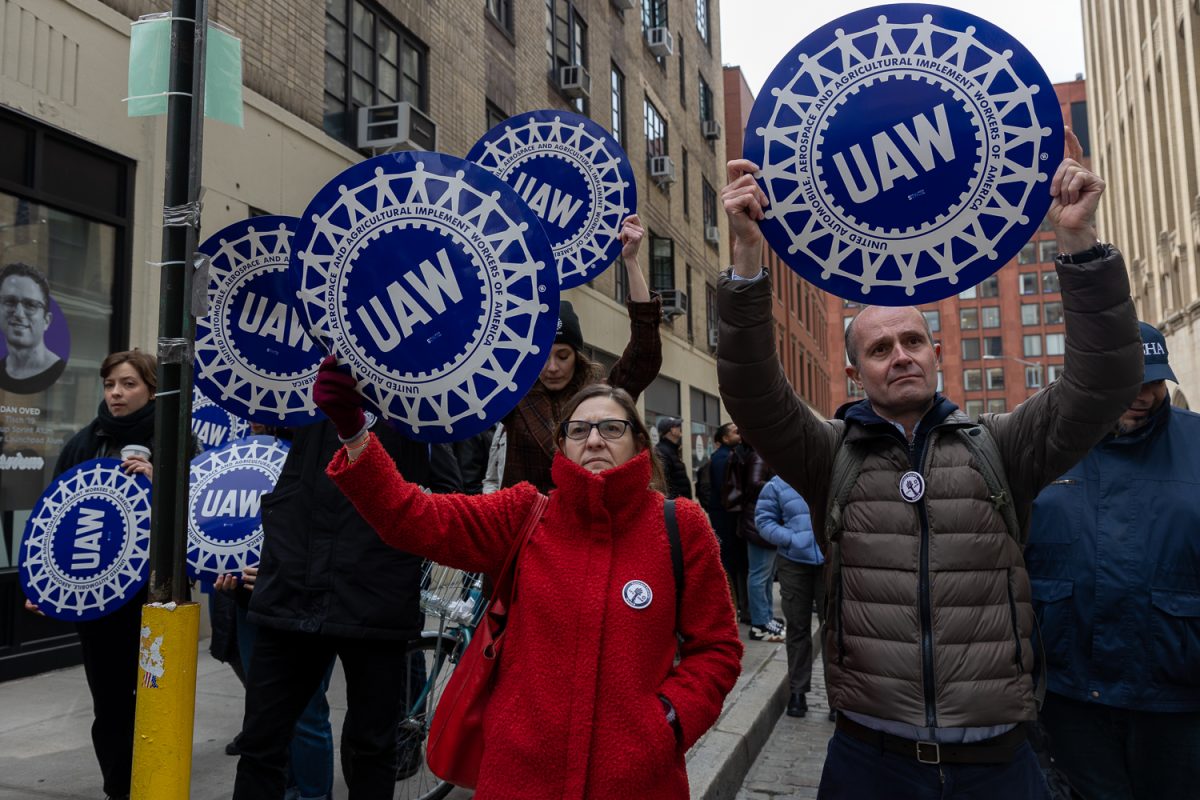Members of NYU’s contract faculty union asked administrators for larger salaries and consistent raises, claiming that many of their colleagues are forced to pick up additional jobs, at their first bargaining session of the academic year on Friday.
Contract Faculty United, which represents more than 900 full-time faculty at NYU, began bargaining last month for an annual 6% base salary increase to be implemented every Sept. 1. Gallatin professor and CFU representative Jacob Remes told WSN that full-time tenured and associate professors currently make 36% more than the average contract faculty member, and that faculty of more than 20 years are making less than newer professors in the same position.
“There’s something called salary compression, which basically means that salaries become stagnant the longer you’re at NYU,” Remes said. “On average, for every year we work at NYU, we make $500 less than somebody who was hired at the same rank this year.”
Remes added that NYU administrators determine the sum delegated toward pay raises at the start of each academic year, and deans distribute the funds among faculty. For clinical faculty, the CFU proposed that assistant professors receive at least $128,000 in salary, associate professors make no less than $158,564 and full-time professors make at least $196,425.
“I’m a single mom living in New York City and I don’t make enough money on my own to support myself and my daughter,” Liberal Studies professor and CFU representative Carley Moore told WSN. “That’s pretty typical and most faculty I know are forced to have second and third jobs.”
Administrators’ counteroffer proposed that all assistant, associate and full-time CFU members receive an annual salary of at least $84,000, $92,400 and $101,640, respectively. They also proposed that 50% of the annual merit increase pool be distributed automatically to returning CFU members, while the other 50% be distributed based on merit.
Both parties agreed on a 10% minimum increase in faculty base salaries following a promotion, with NYU administration allowing for additional, merit-based increases.
“The university has offered 20 counter-proposals in the last three bargaining sessions — towards a fair agreement that recognizes the contributions that bargaining unit contract faculty make towards NYU’s educational mission,” university spokesperson John Beckman said in a statement to WSN. “NYU is fully committed to continued negotiations at the bargaining table to achieve an agreement.”
Since the Trump administration’s crackdown on student visas, CFU has been pushing for NYU to sponsor permanent residence statuses for its international faculty or provide them with a “a visa or a visa extension of their choosing.” Currently, international contract faculty are held on J visas, formally known as Exchange Visitor Visas, which only allow them to temporarily participate in exchange programs in the United States and can make them more susceptible to deportation.
“They just need to put in writing that they will sponsor people for important visas,” Remes said. “We see this as a matter of protection from the Trump administration.”
CFU’s bargaining sessions with the university have been ongoing since the union was formally recognized by NYU in February 2024. Steinhardt professor Maria Rosa Brea-Spahn, who has been a CFU member since it was founded in 2017, said that the group plans to continue pressuring NYU administrators to respond to more of its proposals — which have also focused on issues such as academic freedom in classrooms and vaccination policy.
“The student voice is a very powerful tool sometimes,” Brea-Spahn told WSN. “Students don’t even realize how powerful their voice is — it’s on us to educate them on the hierarchy that make up the university.”
Correction, 9/15: A previous version of this article incorrectly stated that administrators proposed that 0.5% of the AMI pool would go toward all CFU members, and 0.5% would be be awarded to CFU members based on merit. It also implied that the university’s ongoing hiring freeze also applied to faculty. The article has been updated and WSN regrets its errors.
Contact Natalie Deoragh at [email protected].

























































































































































